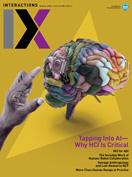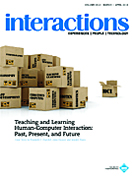Table of Contents
VOLUME XX.2 March + April 2013
-
Demo Hour
-
Embroidered confessions
Julynn Benedetti, Katie Koepfinger, Burcum Turkmen, Laura Simpson, Bob Spikman, Sandra SuijkerBuijk, Rico Minten, Jorien Kemerink
Embroidered Confessions Embroidered Confessions is an interactive quilt woven from a collection of curated secrets of strangers across the Internet. The quilt is a physical interface comprising 10 QR codes that have been embroidered and encoded with URLs that link to a Web interface. These embroidered QR codes are…
-
-
Confessions
-
Confessions of a human-centered designer
Jodi Forlizzi

I never intended to be a designer. I wanted to be a famous artist. As an undergraduate art student, I created a series of fake products that did absolutely nothing as a statement of disdain about consumerism in the modern world. But then I experienced a situation of real…
-
-
Departments
-
User experiences from the land of a thousand lakes
Tuomo Kujala, Jonna Häkkilä

In 2013, SIGCHI has 34 active local chapters in 21 countries on five continents. The total number of local chapter members is more than 3,000. The chapters are doing valuable work in gathering together locally students, academics, and practitioners in the field of HCI. As the vice president for…
-
Community calendar 2013
CACM Staff

March 2013 IEEE VR 2013 Virtual Reality (Orlando, FL) Conference Dates: March 1623, 2013 http://ieeevr.org/2013/ IUI 2013 International Conference on Intelligent User Interfaces (Santa Monica, CA) Conference Dates: March 1922, 2013 http://iuiconf.org/ ECIR 2013 35th European Conference on Information Retrieval (Moscow, Russia) Conference Dates: March 2427,…
-
-
Columns
-
Designing for the ‘emerged’ markets
Rogério De Paula

In the past 10 years or so, emerging markets have become the growth engine of major North American and European multinational organizations. Going after the untapped consumer market created by the "base of the pyramid" (referring to low-income populations), these organizations established local research labs, product teams, and design…
-
Trusting the design process
Jon Kolko

In most professions, process is a dirty word. Process usually indicates a top-down, autocratic set of gates that have been arbitrarily prescribedsteps that are imposed to keep people in check and to keep the industrialized machine humming. But in design, nothing could be further from the truth. For designers,…
-
-
Day in the Lab
-
Human-centered computing lab at Clemson University
Dekita Moon

How do you describe your lab to visitors? The Human-Centered Computing Lab (HCCL) is focused on designing, building, and evaluating computational technologies as they relate to the human condition and reflecting on how these technologies affect society. Addressing national social matters within the School of Computing enables us to…
-
-
Forums
-
Supporting interaction through haptic feedback in automotive user interfaces
Dagmar Kern, Bastian Pfleging

Driving a car today is becoming much like interacting with a mobile computer in a moving environment. Due to the rapid development of sensor technologies and mobile services, the car has already become a space for media consumption, and even acts as a moving office. The car today is…
-
Designing for health activism
Andrea Grimes

Health is a hot topic among technology researchers and practitioners. Medical care is being transformed as health records shift from paper to digital and as physicians increasingly utilize decision-support software, tablet computers, and smartphone apps to augment their practice [1]. The portability and pervasiveness of computational devices have also…
-
Developing our world views
Jennifer Pearson, Simon Robinson

In the past few years, there has been a surge of research focused around the so-called developing world. Much of this work is currently conducted by researchers trained in the West, moving from more privileged environments to a completely new place, in an entirely different contextcommonly known as research…
-
Neurodiversity HCI
Nick Dalton

Doug Englebart said, "[A] computer is a device for thinking with." This ability to assist the process of thought separates computing from most other technologies. Historically, human-computer interaction focused on the use of technology in the workplace and could speak about the user in the singular. This singular user…
-
Bridging the CEO credibility gap
Daniel Rosenberg

Having recently made the transition from a 30-year career leading industry UX teams to becoming a UX strategy consultant and professor, I have a natural opportunity to refine my perspective on how companies should best utilize UX data to inform business-level design investments in products and services. This forum…
-
Long time together
Pu Yang

Image Contributor: Pu Yang Genre: Documentary imagery and reflection The contributor's great grandparents, who have been together for more than 70 years, posed for this portrait. The durability of this lifelong relationship lacking in technological intervention is inspirational, and stands in stark contrast to many modern, short-cycle, technology-mediated relationships,…
-
-
Features
-
Mobile collocated interactions
Andrés Lucero, Matt Jones, Tero Jokela, Simon Robinson

According to Cisco, in 2012 we reached the point where there were more mobile phones than people on Earth (there are now also more people with access to a mobile device than a toothbrush). What used to be a device mostly for professional use now pervades every aspect of…
-
App stores
Niels Henze, Martin Pielot

Studies in HCI research are often conducted in a highly controlled environment with a small, convenient sample. Such studies can have a high internal validity but often lack external validity. That is, the findings themselves can be reliable but cannot always be generalized to real contexts. To address this…
-
Data in the wild
Chee Ang, Ania Bobrowicz, Diane Schiano, Bonnie Nardi

In recent years, the proliferation of online services such as social networking, gaming, Internet fora, and chat rooms has provided academic and corporate researchers opportunities to acquire and analyze large volumes of data on human activity and social interaction online. For example, massive corpora from Facebook, Twitter, and other…
-
Materiality matters—-experience materials
Mikael Wiberg, Hiroshi Ishii, P. Dourish, Anna Vallgårda, Tobie Kerridge, Petra Sundström, Daniela Rosner, Mark Rolston

The theme for last year's ACM CHI 2012 conferenceIt's the experienceunderscores an important shift in HCI research: a move away from a perspective that treats people and computers as two separate and distinct entities toward a perspective that acknowledges how people, computational materials, and even traditionally non-computational materials are…
-
Why Microsoft Word does not work for novice writers
Joohee Huh

Have you ever written five paragraphs, without any tool, all in one draft? I raise this question to think about the relationship between the function of tools and thought in writing. Since writing activity, as one of the external symbolic forms, is based on visual representation, it necessarily involves…
-
Elections
Whitney Quesenbery

Early on the morning of November 7, 2012, President Obama claimed victory in the U.S. presidential election. In the usual thanks to "every American who participated in this election," he also mentioned the hanging chads of 2012long lines waiting to votesaying, "By the way, we have to fix that"…
-
-
Cover story
-
Teaching and learning human-computer interaction
Elizabeth Churchill, Anne Bowser, Jennifer Preece
Human-computer interaction is a discipline concerned with the design, evaluation, and implementation of interactive computing systems for human use and with the study of major phenomena surrounding them. Thomas T. Hewett et al., 1992 Human-computer interaction (HCI) as a field of inquiry necessarily evolves in response to changes in…
-



